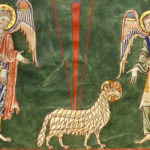We run our website the way we wished the whole internet worked: we provide high quality original content with no ads. We are funded solely by your direct support. Please consider supporting this project.

The Entire Old Testament is About Jesus
Jesus himself taught that he carried more authority than any prophet that predated him. Though Jesus regarded John as the greatest prophet up to himself (Matt 11:11), he claimed his own “testimony” was “weightier (megas) than that of John” (Jn. 5:36). Jesus certainly wasn’t denying John or any previous true prophet was divinely inspired. But he just as clearly was claiming that his revelatory authority trumped everything leading up to him.
In fact, in this same passage Jesus goes so far as to claim that he is the ultimate subject matter of previous revelations. In the course of confronting the Pharisees, he says: “You study the Scriptures diligently because you think that in them you possess eternal life. These are the very Scriptures that testify about me, yet you refuse to come to me to have life” (5:39-40). For this reason Jesus claimed that Moses would serve as their “accuser,” exposing their unbelief. For, Jesus added, “If you believed Moses, you would believe me, for he wrote about me” (5:45-46, emphasis added).
Jesus made the same point to certain disciples after his resurrection. After chiding them for being “slow to believe all that the prophets” had spoken about him, Jesus explained his death and resurrection by teaching them that “[e]verything” that was written about him in “the Law of Moses, the Prophets and the Psalms” had to be “fulfilled.” And in this way “he opened their minds so they could understand the Scriptures” (Lk 24:25, 44-45). In Jesus’ day, the phrase, “the Law, Prophets and Psalms” was widely used to refer to the whole OT.
So too, when Jesus explains his death and resurrection by associating them to what “must be fulfilled” (vs.44) and to “what is written” (vs. 46), he is alluding to the essence of the entire OT Scriptures, and not merely to a few verses that predicted these things. The same could be argued when Luke says Jesus “explained to them what was said in all the Scriptures concerning himself” (vs.27) and when he concludes that Jesus “opened their minds so they could understand the Scriptures” (vs.45). Throughout the passage, Jesus has the entire OT in view, not just selections from it. Thus we can conclude with Graeme Goldsworthy that “Jesus says the whole Old Testament, not merely a few selected texts, is about him.”[1]
On this basis, Poythress concludes that this “particularly important” passage is intended to teach that “Christ himself indicates that the Old Testament from beginning to end is about himself” and that “[t]he whole of the Old Testament … has as its central message the suffering and resurrection of Christ.”[2] David Dockery also concludes from this passage that “[f]or Jesus, the key to understanding the Old Testament was located in his own life and work, for everything pointed to himself.”[3]
Hence, this passage, as well as the earlier mentioned Johannine passage, force us to conclude that, regardless of how “diligently” one studies the Old Testament, one can’t be said to have arrived at the full, complete interpretation of any passage until they have disclosed how it bears witness to the one who is the ultimate revelation of God. Since Jesus’ testimony is “weightier” than John the Baptist, and therefore “weightier” than all preceding speakers, the revelation that comes through Jesus must never be placed alongside of any others. Rather, all others must be interpreted in light of the revelation that comes through Jesus.
[1] Goldsworthy, Gospel-Centered Hermeneutics, 252.
[2] Poythress, God Centered, 60
[3] D. S. Dockery, Biblical Interpretation Then and Now, 26.
Photo via Visualhunt
Category: General
Tags: Bible Interpretation, Cruciform Theology, Old Testament
Topics: Biblical Interpretation
Related Reading

Cruciform Aikido Pt 3: The Judge Who Lets Them Have It
We ended our last post noting that in the cross God ingeniously turned evil back on itself and triumphed over it. But what does all this teach us about the nature of divine judgment? Two things. First, as the one who bore our sin, Jesus experienced the judgment we deserved when the Father withdrew himself and…

Podcast: Do We Apply a Cruciform Lens to the Writings of Paul Even Though He Writes After Christ?
Greg talks about Paul and Peter and the slow acclimation of Christ’s message in the early church. http://traffic.libsyn.com/askgregboyd/Episode_0413.mp3

The Centrality of the Cross in Church History
Some readers of Crucifixion of the Warrior God may be assuming that the emphasis I’m placing on the cross is unprecedented in church history. While I will not deny that the cross-centered approached to interpreting Scripture’s violent divine portraits is new, the fact that I’m placing the cross at the center of my understanding of…

What Is God’s Glory?
In John 12 we find a view of God’s glory that challenges many modern notions of what the glory of God means. In this passage, we find that Jesus was “troubled” by the cross that lay ahead to such an extent that he wanted to cry out, “Father, save me.” But Jesus quickly expresses his…

Frank Viola’s Interview With Greg: OT Violence and the Spirit World
I have not yet personally met Frank Viola, but over the last several years we’ve conversed and debated a good deal, to the point that I consider him a good friend. He is one of those all-too-rare types of people who is solidly grounded in the Word and yet who is not enslaved to traditional…

Old Testament Support for the Warfare Worldview
Rebuking Hostile Waters Satan plays a minor role in the Old Testament relative to the New Testament. Instead, the warfare worldview in the Old Testament is expressed in terms of God’s conflict with hostile waters, cosmic monsters, and other gods.Like their Ancient Near Eastern neighbors, ancient Jews believed that the earth was founded upon and…
